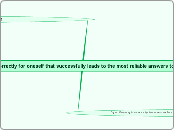Critical thinking is thinking correctly for oneself that successfully leads to the most reliable answers to questions and solutions.
The scientific method has proven to be the most reliable and successful method of thinking in human history, and it is quite possible to use scientific thinking in most human endeavours. Critical thinking is the most important skill a student can learn
Empirical Evidence- it is evidence that one can see, hear, touch, taste, or smell
It is important because it is evidence that can be rechecked by yourself and others after knowledge claims are made by an individual.
other types of evidence can contrast empirical evidence, however most is considered unreliable such as hearsay, testimonial evidence, emotional evidence, revelatory evidence, spectral evidence &circumstantial evidence
authoritarian evidence is reliable evidence, but many authorities are not reliable, so you must be your own authority and rely on your own powers of critical thinking
Logical Reasoning is not an ability that humans are born with or one that will gradually develop and improve on its own, but is a skill or discipline that must be learned within a formal educational environment
Most individuals would rather believe something is true because they feel it is true, hope it is true, or wish it were true, rather than deny their emotions and accept that their beliefs are false.
many illogical arguments and statements are accepted and unchallenged in modern society--often leading to results that are counterproductive to the good of society or even tragic
Emotions are not evidence, feelings are not facts, and subjective beliefs are not substantive beliefs
The best way to learn to think logically is through reading, writing, maths and science
Skepticism-You must question the truth and reliability of both the knowledge claims of others and the knowledge you already possess.
A skeptic holds beliefs tentatively, and is open to new evidence and rational arguments about those beliefs.
